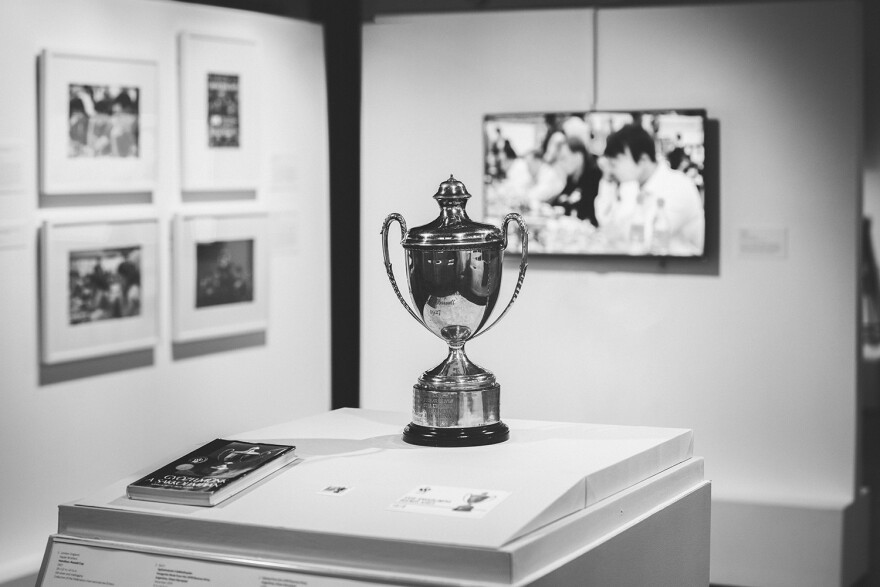In 2016, Americans made history by earning team gold in the Chess Olympiad, a biennial tournament in which teams of chess players represent their countries. The remarkable 2016 team included grandmasters Fabiano Caruana, Hikaru Nakamura, Wesley So, Sam Shankland and Ray Robson, with international master John Donaldson as team captain and Aleksandr Lenderman as team coach.
The early years of the Chess Olympiads had marked a golden age in American chess, when players brought home team gold four times in a row (1931, 1933, 1935 and 1937). The 2016 victory—the first in 40 years and the first in an Olympiad that included Russian or Soviet teams—is part of a current resurgence of chess in the United States. The World Chess Hall of Fame is currently celebrating the victory with an exhibition titled Global Moves: Americans in Chess Olympiads, which explores the history of American teams in the Chess Olympiads, from the early years through 2016.
Kevin Duggin of Spectrum Studios conducted interviews with the players, coach and captain of the 2016 Chess Olympiad team at various tournaments and via phone to capture the thrilling emotions felt during the historic win. We've transcribed the answers and edited them for clarity below.
Question: What was it like to win the Chess Olympiad?
Fabiano Caruana: I don’t know if we could have expected that we would win. We were second seed at the start, and first through third seeds were very close in terms of average rating of all the players. It is not something you can expect to win because there are so many strong teams, and so much is based on things which aren’t really in your control. It’s possible for one team to run away with it, and normally that is what we would have done because we had such a strong score. We tied two matches, and we won the rest, which is just phenomenal. Normally, it would be enough for a clear victory, but we still didn’t know if we had won because they had to calculate the tie breaks. There was a tie with Ukraine, and it was such a closely fought Olympiad. To be on the team where every player contributed so much and managed to win an Olympiad when another team, like Ukraine, was doing so well was exciting.
Sam Shankland: In a lot of ways, it was similar to any other tournament. I did all the same things. I went to bed at the same time. I regulated my eating the same way. I played as best I could, but at the end, it really made a difference and we rewrote history as opposed to playing another event where you had a strong result. For the first time, it really felt like I was playing for something much bigger than myself. Chess is usually a very individual game, and it was a real honor to bring back a gold medal for my country.
Question: What is it like to be on a team with players against whom you normally compete?
Wesley So: Chess is really an individual sport, unlike basketball where you play with four other people in the same game. Chess is a little bit different because you can’t really talk to your teammates when the game starts. But, of course, it’s important to see how they are doing in the Olympiad since four players compete in each round, and you have to score at least 2 1/2 to win the match. I think the important thing about the Olympiad is it showed us how to work together, how to share ideas, and how to learn from the strengths and weaknesses of each member of the team. While the game is going on, you need to see how everyone is doing. For example, in our match against Russia, Fabiano had a difficult position against Sergey Karjakin. He was black and he was slightly in trouble in that game, and Hikaru was going to draw. Even though I had the black pieces, I kind of had to steer the game into a longer game and that just forced the issue. In situations like that, you need to know when to play for a win and when to play for a draw. It has been a memorable experience, because I don’t get to play many team events. I only played in the Olympiad last year and the PRO Chess League this year, which is also similar.
Ray Robson: I have played on a team before as part of the Webster University team. Being on a team with people whom I usually only play against in the U.S. Chess Championship is a bit different. Everyone is really professional and supportive, and so no one really questioned whether I should be playing this round or if someone else should be playing. We just decided whatever was best for the team. It’s a bit of a challenge, but everyone worked together really, really well.
Question: What is the impression of the United States players on the international stage?
Hikaru Nakamura: I think we are all considered very, very strong chess players. We’re in the top five or top 10 in the world, give or take which month it is. So, I think in general there is a lot of respect for what’s going on with American chess. I think certainly when you have three players who reach that level, it’s very rare, and so clearly something is going right here in the United States.
As American athletes compete at the 2018 Winter Olympics, the World Chess Hall of Fame invites fans to learn about American chess players who have competed in another global competition. To view memorabilia from the historic 2016 win and Chess Olympiads past, visit the Global Moves: Americans in Chess Olympiads at the World Chess Hall of Fame. You can also view a short documentary about the exciting 2016 Olympiad experience https://youtu.be/DRsZJF1NDEQ">here.
Emily Allred is Assistant Curator at the World Chess Hall of Fame

